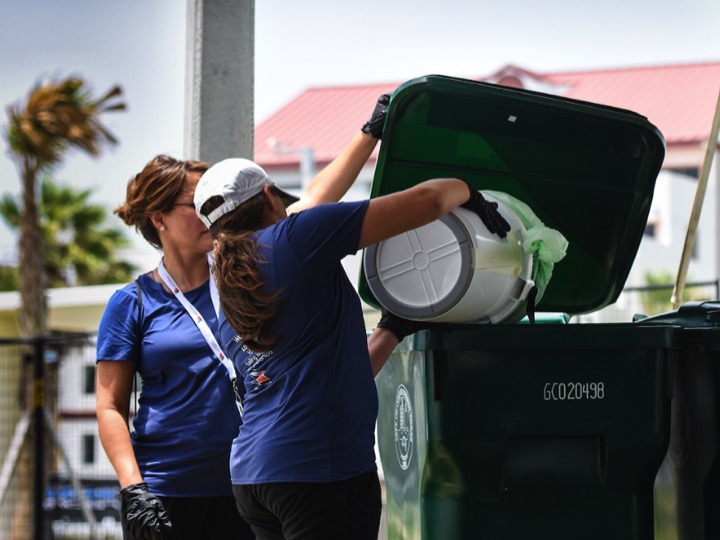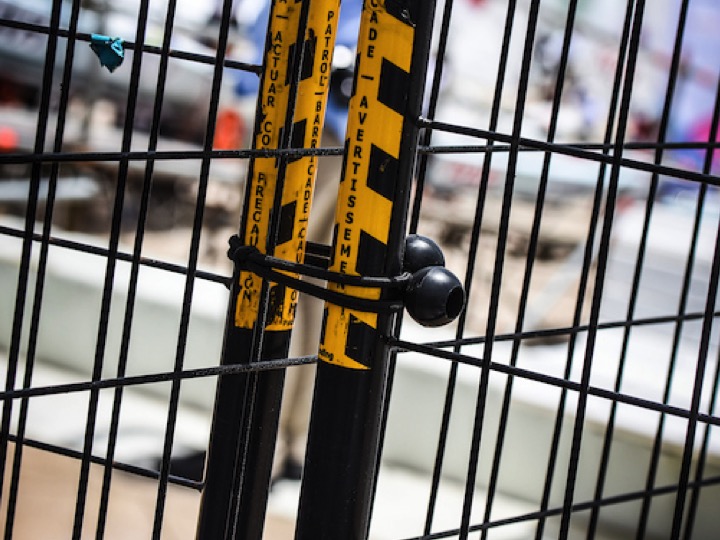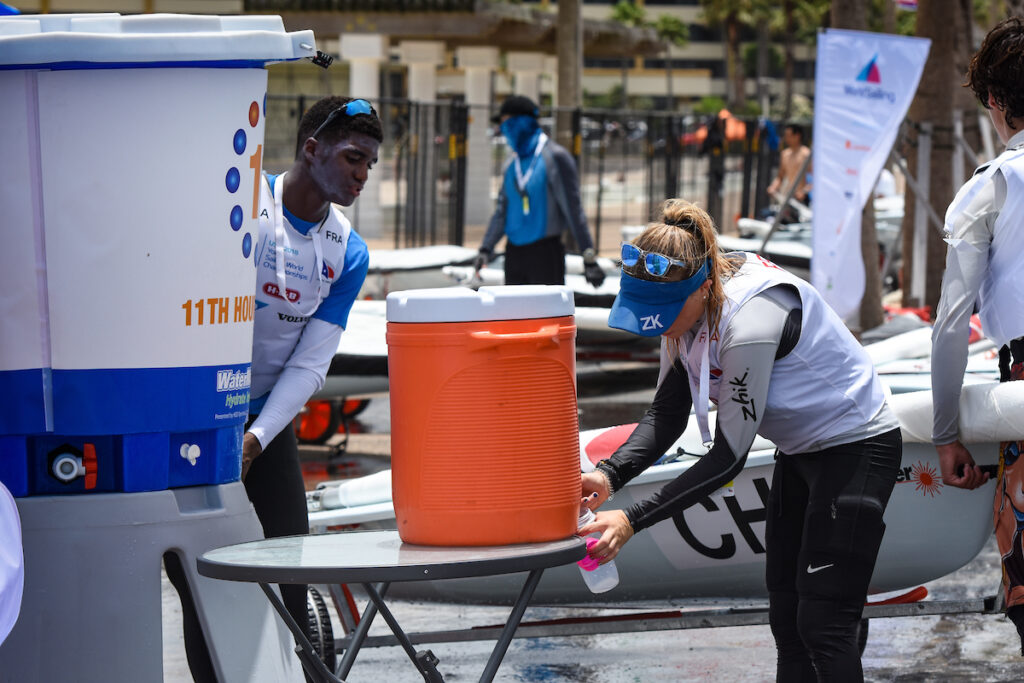



Junior regattas come in all shapes and sizes. From a Clean Regattas perspective, they run the gamut between being very well organized to “disorganized but well-intentioned.” The Corpus Christi Youth Sailing World Championships held in July 2018 definitely fits into the former category and was able to make sustainability such a priority that we awarded them Platinum level certification.
In addition, they were also awarded the first ever World Sailing 11th Hour Racing Sustainability Award for their dedicated work towards fostering an ocean conservation and sustainability theme. Over 382 sailors from 66 nations were represented; an undertaking that required over 377 volunteers over the course of the seven-day regatta.
No Single Use Plastic Water Bottle Policy
Event organizers placed a heavy emphasis on ditching single-use water bottles. With the regatta taking place in the hot Texas sun, this presented a difficult logistical challenge for organizers. The heat and humidity were exceptionally high and the risk for heat stroke was a potential safety hazard. In the past, local regatta organizers had large cases of 12 oz. single-use plastic water bottles in coolers ready to be distributed but the Green Team worked hard to switch to a more sustainable system both on the water and on land.
Much of this effort started in the planning phase before the regatta happened. Prior to the event, all competitors, coaches, race committee, and volunteers were told to bring a reusable water bottle and that a “no single-use plastic water bottle policy” would be in effect.
Four 125-gallon bulk water dispensers with six spigots each were purchased to use on land. One was placed at the yacht club and used by race committee, judges, media, and by coaches to fill up large 5-gallon jugs which could be used on the water. The other three 125-gallon water dispensers were strategically placed around the venue and consistently filled with ice to keep water cold.
On the water, Corpus Christi Yacht Club purchased thirty 5-gallon jugs which were refilled each morning and reused the following day. In total, it was calculated that 65,000 12 oz. single-use water bottles were saved by these measures.
Don’t Sweat The Small Stuff
When we think of sustainability, it’s easy to think of making changes to cut down on large items of trash, but sometimes it’s the smaller bits of trash that we tend to overlook that can easily be replaced by a more eco-friendly option. Take zip ties for instance. All of the temporary metal fencing and all of the sponsor-banners at the Youth Sailing Worlds were originally going to be attached via plastic zip ties. A key decision was made to purchase 400 bungee cord connectors that accomplished the same goal but created much less waste at the end of the day. When bungee cords wouldn’t work (like with race committee flags), 200 reusable zip ties were employed. They held up very well and according to event organizers have been employed at two other regattas in Texas.
Vendors and sponsors were not allowed to bring their own banners per the local organizing committee. All competitors were given reusable bags and totes to carry their gear and the local organizing committee roundly saw this as a huge success.
Behavioral Habits
A pre-race sustainability survey was distributed to sailors, team leaders, coaches and volunteers to gauge sustainable habits. After a week of educating participants through conservation booths, environmental movies, presentations and artwork, a post-race survey was distributed. The pre-race survey revealed that many people (>90%) own a reusable water bottle and that 70% of these people use it often or always. The top reasons listed as to why participants didn’t use them were that they forgot (72%); it was inconvenient (13%); or that it was too heavy (5%).
On the post-race survey, 87.6% of respondents said that the sustainability efforts enhanced the event and an overwhelming majority (95.6%) would like to see sustainability initiatives at all sailing events.
Race organizers found that raffling off prizes for those who filled out the pre-race survey encouraged participation. Also, in the survey comments, it was discovered that there’s still a major gap in understanding between what is considered “recyclable” and what is considered “compostable”.
Education
The local organizing committee did an amazing job using art exhibits, guest speakers, and getting participants to engage with ocean-themed projects in the month of July.
Dr. Sylvia Earle, renowned marine biologist, explorer, author, lecturer and Time Magazine’s first “Hero for the Planet”, spoke at the opening ceremony about her knowledge of sustainability and conservation acquired from over 50 years of experience.
Two beach cleanups occurred before and after the Youth World Championship and 18 volunteers worked to properly dispose of collected waste. Pictures of the waste were posted via social media to educate the public about current environmental issues. Of the trash collected, 25 trash bags worth were collected before the event but only two bags were necessary to clean up residual waste left after the Youth World Championships. A huge success!
In addition to educating participants, the entire staff of the Corpus Christi Yacht Club was required to attend a power-point presentation on the sustainability initiatives being implemented at the Youth Sailing World Championships. This was considered mandatory for all staff – administrative, as well as financial office staff – and it was reported that the staff became excited about working together to achieve the lofty goal of Platinum level certification. Getting staff buy-in and support was critical to accomplishing the sustainability goals of the YSWC, especially the composting and no single-use plastic water plastic policies.


